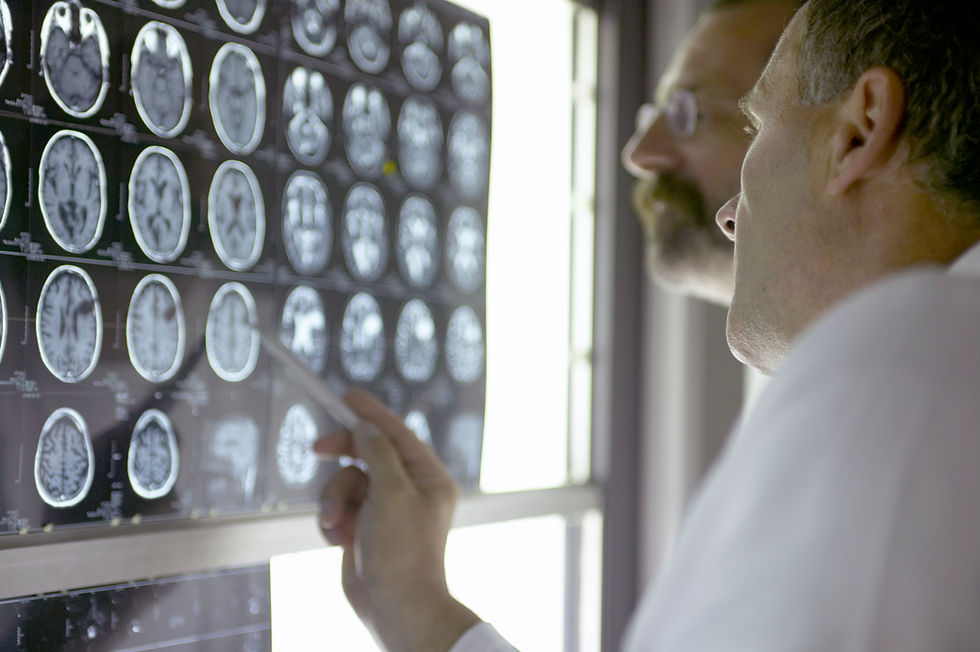What are the early signs and symptoms of cancer?
- Dr Philip Borg MD

- Jun 12, 2023
- 3 min read
Updated: Jun 18, 2023
This blog is the 2nd in a series of 5 on the topic of cancer written by Dr Philip Borg MD FRCR FAAMFM.
Dr Borg is a Consultant Cancer Interventional Radiologist and a Longevity Medicine Specialist.
In the previous blog we learnt that cancer is actually a set of diseases in which some of the body’s cells grow uncontrollably and may spread to other parts of the body. Since cancer can start almost anywhere in the human body and because cancer can grow in different organs and from different cell types, the signs and symptoms caused by cancer will vary depending on which body part is affected. Each kind of cancer is usually named after the cell type in which it begins, for example melanoma describes a cancer which started in the skin cells known as melanocytes.
The signs and symptoms of cancer will depend on numerous factors including where the cancer is, the size of the cancer and how much it affects neighbouring tissues and organs. If a cancer has spread (metastasised) these signs and symptoms may also appear in different parts of the body.
Cancers can take many years to grow to a size where they produce signs and symptoms. Research shows that bowel and breast cancers take up to 10 years before they grow to a detectable size. During these years the cancers are changing and growing but are not causing signs or symptoms. Cancer screening aims to detect cancers at this asymptomatic stage.
Signs and symptoms are your body’s way of letting you know that something is not right - either due to illness, disease or injury. A symptom is subjective and felt by the individual who has it, for example pain and fatigue. A sign, is something objective that can be observed by the person who has it as well as others for example a lump or bleeding.

Cancer can cause signs and symptoms locally (in the tissue or organ where the cancer is arising) or systemically (the way it affects the whole of the body).
Local signs: Lump, bleeding
Local symptoms: Pain, itchiness
Systemic signs: Weight loss, night sweats
Systemic symptoms: Loss of appetite, fatigue
Cancer is a complicated set of diseases with a wide range of signs and symptoms. Importantly some conditions may mimic cancer, for example a lump may be due to infection; loss of appetite may be due to a virus.
The following are a number of general cancer signs and symptoms which one should look out for.
Systemic signs and symptoms of cancer:
Unexplained and unintentional change in weight
Fatigue / chronic tiredness for no clear reason
Unexplained bruising or bleeding including blood in urine, faeces, vaginal (not menstrual) vomiting or coughing
Unexplained and persistent pain or ache
Unusual and persistent lump or swelling anywhere in the body
Persistent, unexplained fever and night sweats
These systemic signs and symptoms are not exclusive to cancer. Many cancer symptoms may resemble other, less serious illnesses. It is important to know what is normal for yourself and seek medical advice should you notice any unusual, unexplained and persistent symptoms.
Cancers can also cause local signs and symptoms due to effect on tissues or organs that they arise from or spread to.

The six most common cancers occurring worldwide are breast, lung, colorectal, prostate, skin (non-melanoma) and stomach. These six account for more than 52% of all cancer diagnoses worldwide. The following are the local signs and symptoms of the commonest cancers to look out for:
Breast cancer:
New lump or thickening on breast or armpit
Change in size, shape or feel of breast
Changes to skin on breast, e.g. puckering, dimpling, redness, rash
Fluid discharge from nipple
Change in position of nipple
Lung cancer:
New or persistent cough
Coughing up blood
Getting breathless doing something which never made you breathless before
Pain or ache in chest or shoulder
Recurrent or persistent chest infection
Colorectal cancer:
Blood in poo or bleeding from rectum
Persistent change in normal bowel habit
Unexplained, persistent bowel discomfort
Prostate cancer:
Usually causes symptoms once it has spread - systemic signs and symptoms
Non-melanoma skin cancer:
Sore or area of skin which doesn’t heal
Sore or area of skin which looks unusual
Sore or area of skin which hurts, itches, bleeds, crusts or scabs persistently
Stomach cancer:
Loss of appetite and/or feeling full after eating small amounts
Difficulty swallowing
Nausea or vomiting
Tummy pain
Persistent indigestion
Again, having these symptoms doesn’t not necessarily mean you have cancer. Also, these lists are by no means exhaustive. However being aware of the common signs and symptoms, as well as knowing what is not normal for you, can help spot cancer early which can make a real difference.
The importance of cancer prevention, cancer screening and cancer treatment will be discussed in future blogs in this 5 part cancer series. For more information about our cancer screening service please visit https://www.longevitydoctor.net/cancerscreening
